
On a global basis, public sector corruption amounts to between $1.5 trillion to $2 trillion annually. This figure was announced by the International Monetary Fund in a research paper. It added that this sum siphoned from the global economy in terms of bribes, costs far more in stunted economic growth, lost tax revenues and sustained poverty.
Publicité
Mauritius has tumbled on Transparency International’s Perception of Corruption Index in 2016. It now ranks 50th over the 176 countries covered by the report. Despite measures taken by the current government such as the Unexplained Wealth legislation and a general crack-down on corrupt practices there seems to be a perception that graft is far from being eradicated from the country’s economic landscape.
Mauritius has an anti-corruption agency, the Independent Commission Against Corruption, or ICAC as it is more widely known. Nevertheless, kick-backs seem to be more current than thought and the agency has embarked, year in year out, on sensitisation campaigns to stem this societal scourge.
In his Private Notice Question dated 18th April 2017, the leader of the opposition, Mr Xavier Luc Duval, has sought answers from the Prime Minister, Mr Pravind Jugnauth, regarding the government’s drive to stall corruption.
The Prime Minister announced that a Ministerial Committee was set up in January 2016 to examine the various aspects of our electoral system and make appropriate recommendations for reform, including anti-defection measures, the widening of the powers of the Electoral Supervisory Commission; and the Financing of Political Parties. This last subject which is largely unregulated, is believed to be the root of all evil.
Accordingly, it has been stated that government will be introducing an anti-defection legislation. Moreover, ICAC has developed a draft code of conduct for members of the National Assembly, including Ministers. The draft code is intended to provide strict guidelines for the conduct of members of the National Assembly as well as public officials. Similarly, the Ministry of Civil Service and Administrative Reforms has also developed a draft code of conduct for Ministers.
Additionally, it has been stated that ICAC has set up a Working Committee to examine the provisions of the two draft codes with a view to determining whether they should be harmonised or merged. The Working Committee comprises representatives from the Prime Minister’s Office, the Solicitor-General’s Office, the Ministry of Civil Service and Administrative Reforms, the National Assembly and the ICAC.
As announced in the Government Programme 2015-2019, the process of tendering, procurement and contract allocation and management is continuously being reviewed to ensure greater transparency and prevent corrupt practices in the allocation of contracts in the public sector, the recent one being the need to require the approval of the CPB with respect to variation of major contracts.
E-procurement system
During the PNQ, it has been revealed that a new process for e-procurement system has been introduced to reduce human interaction in the tendering procedures and prevent potential for fraud and corruption. A Code of Conduct on procurement for public officials was issued jointly by ICAC and PPO to clarify the role and responsibilities of public officers in carrying out procurement activities.
Mauritius Revenue Authority
At the level of the MRA also measures were taken to prevent any corrupt practices at the level of Customs, VAT and Income Tax as follows:
- Electronic Filing and Electronic Payment of Bill of Entry, VAT and Income Tax Returns
- Examination of goods at the level of MRA Customs is being carried out under CCTV Cameras
- Hotline Electronic Platform to report complaints and corrupt practices
- An Internal Affairs Division has been set up within the MRA to conduct enquiry into alleged cases of malpractices by officers of MRA.
 Jack Bizlall: “Penalties should be harsh”
Jack Bizlall: “Penalties should be harsh”
Political observer Jack Bizlall states that corruption is a complex issue and there are lot of questions to answer to be able to understand the depth of issue. According to him, corruption in all its forms exists in Mauritius but we must know what kind of measures really to be taken. “In various countries, harsh punishments are handed out for the act of corruption. Do these punishments really prevent people from engaging in corruptive practices or do they always find a way to manipulate things? Many people practice corruption in a disguised way. In some countries like China, corruption is a major offence where the punishment is high,” he says. China has the death penalty for corruption. For him, the punishment must be harsh to combat corruption. “Apart from condemnation, the property of the condemned as of its immediate parents or heirs must also be seized. Another question is should there be different laws for the regulation of corruption? The answer is simple: only one institution is enough for the prevention, awareness and penalisation. The head of ICAC must be a retired Chief Justice and the tenure should be limited to only two years. Instead of just creating or introducing all kinds of laws, we need to work on the existing ones making them concrete and more feasible.”
 Rajen Bablee: “Politicians should not be above the law”
Rajen Bablee: “Politicians should not be above the law”
In a short interview, Executive Director of Transparency Mauritius, Mr Rajen Bablee, analyses the current corruption climate in Mauritius. He elaborates on the various kinds of corruption and how the scourge has been detrimental to our image.
What is your analysis of corruption in Mauritius?
If we go by the Corruption Perception Index of Transparency International for 2016, Mauritius ranked 50th. It has fallen from 45th. So, it has dropped 5 places but, at the same time, improved its score from 53 to 54. This means that some other countries which have overtaken us have been more proactive. So, we must do better if we want to become an example in the region. There is clearly a perception from the layman that corruption is rampant in every sphere of society. But corruption is a hidden activity and it is only when it is reported that we become aware of it. So, it is difficult to have a clear and clean picture. If we analyse through rumours, then we top the list. If we analyse through the number of cases won in Courts, then it is much less. If we judge regarding the number of complaints (anonymous or open) made, then it would be between the two. But one prominent issue is the culture whereby the common Mauritian who claims to be a law-abiding citizen would candidly flout the law when no one is watching or when it suits his own interest. Then there is that insular issue of “trafic d’influence” which does not necessarily imply that all do it for money. Rather it is just because you know your vis-à-vis.
What are the forms of corruption prevailing in Mauritius?
In general, petty corruption is less prevalent than grand corruption. However, it is still more complex to detect and investigate grand corruption as often, it implies politically exposed persons, bank accounts in foreign jurisdictions and intermediaries. We have those issues linked to politics and mercantilism. It is high time that government address the question of financing of political parties as well as the funding of politicians with an appropriate legislation which would bring transparency in the political sphere. Politicians should not be above the law. Then it should be an offence for a politician to promise a job or a contract to any person and likewise it should be a criminal offence if any voter would seek a job or contract from any politician. Politicians must be taught that they are elected to define policies and take decisions for the good of the country and not to offer advantages to their lovers, family members or agents.
Do you think the authorities are taking enough measures to combat corruption?
Mauritius generally ticks all the boxes when it comes to laws and procedures but the real issue is whether the right signals are being given. When the present government came into power in December 2014, there was hope. Their programme included several measures against corruption and for the rule of law, meritocracy and transparency. More than two years later, the measures are still to be seen. Now, it is mentioned that such laws are complex and need redrafting. This can give a perception of delaying tactics. Fighting corruption is a complex issue and one cannot restrict corruption to the public sector. It is a pity that in Mauritius, though being a member State of the United Nations Convention Against Corruption, corruption in the private sector is not properly addressed. Criminalising corruption in the private sector is a sine qua non for an efficient fight against that scourge. And for that to work properly, it should be accompanied by an appropriate whistle blowing legislation which would guarantee the security of those raising bona fide concerns. And more can be done: the very basic point is to promote meritocracy in all spheres and mostly in public institutions and that those institutions, such as the Financial Services Commission, perform in all independence. But then you must also have leaders who demonstrate integrity. There have been so many accounts of heads of institutions who just rubber stamp what they are being told. Either because they are incompetent, underqualified or that they are simply corrupt and out to take advantage of public money.
Has the situation in Mauritius negatively impacted on the country’s image?
Any turmoil brings its lot of negative impact and has consequences, either short term or long term. Any bad publicity is bad for the country and affects its reputation. So, it is important for institutions to perform, for public officers to demonstrate integrity, for the media to be factual and for the government to lead by example through good governance. And we should not forget the importance of efficient communication. I believe that if Mauritius comes up quickly with a revamped Declaration of Assets legislation, a Freedom of Information Act, a whistleblowing legislation as well as on to control the funding of politicians and political parties. The negative impact might be subdued and would show a real intent from the government. Before the end of its mandate, the people of Mauritius and the entire world would have a precise idea of the credibility and worth of the words of the present government. We hope they will be true to its promises.
 Sunil Bheeroo: “The unexplained wealth legislation is ineffective”
Sunil Bheeroo: “The unexplained wealth legislation is ineffective”
Barrister Sunil Bheeroo explains that at the time when the legislation was being introduced, he had expressed his reservation as to its implementation. “The unexplained wealth legislation has proven to be ineffective. Whilst it is necessary to have legislation applicable to unexplained wealth, the way it was introduced was wrong in as much as it was being imposed and perceived to be introduced with a political agenda. Now that it has been enacted, we would wish to see its effectiveness especially with those who have become increasingly rich in no time and thus cannot justify their wealth.” Talking about legislation on corruption, Sunil Bheeroo states there are laws such as POCA and provision under the criminal code but still the legislation ought to be reviewed to keep pace with actual development knowing that there are many people who are victims of corruption and yet they are still being prosecuted for an ignorant act. “We live in a very small society where too much of legislation will make the society become overregulated. We should have more qualified people to tackle offences of corruption. The government should not hesitate in sponsoring competent officers to undergo further training and qualification with a view to bring their expertise and pass on their expertise to other officers. There are too many piecemeal provisions under the current Act. This should be brought under one umbrella and probably with the introduction of financial fraud legislation it will be better handled by sending a strong signal to those who intend to poison our society and our future generation.”
Commenting on the introduction of a Freedom of Information Act, he says: “All stakeholders have militated for the introduction of a Freedom of Information Act. But sadly, we have yet to see a first draft. Knowing that freedom of information is already provided for in our Constitution. Everybody seems to be talking of a modern society with proper rule of law and regulation. So long as we introduce it within the proper legal framework, one should not fear of its implementation.”

Notre service WhatsApp. Vous êtes témoins d`un événement d`actualité ou d`une scène insolite? Envoyez-nous vos photos ou vidéos sur le 5 259 82 00 !
















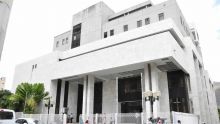
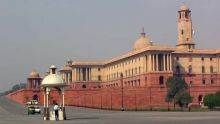


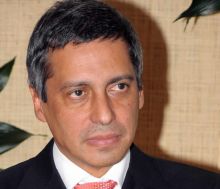

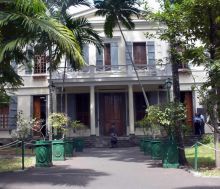
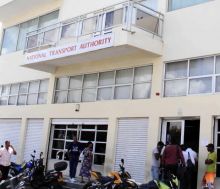



![[Édition spéciale Info Soirée] : « 2015-2025 : le poids d’une faillite d’État ? »](https://defimedia.info/sites/default/files/styles/square_thumbnail/public/promo-info-soiree_020425.jpg?itok=4SvgFNCN)





